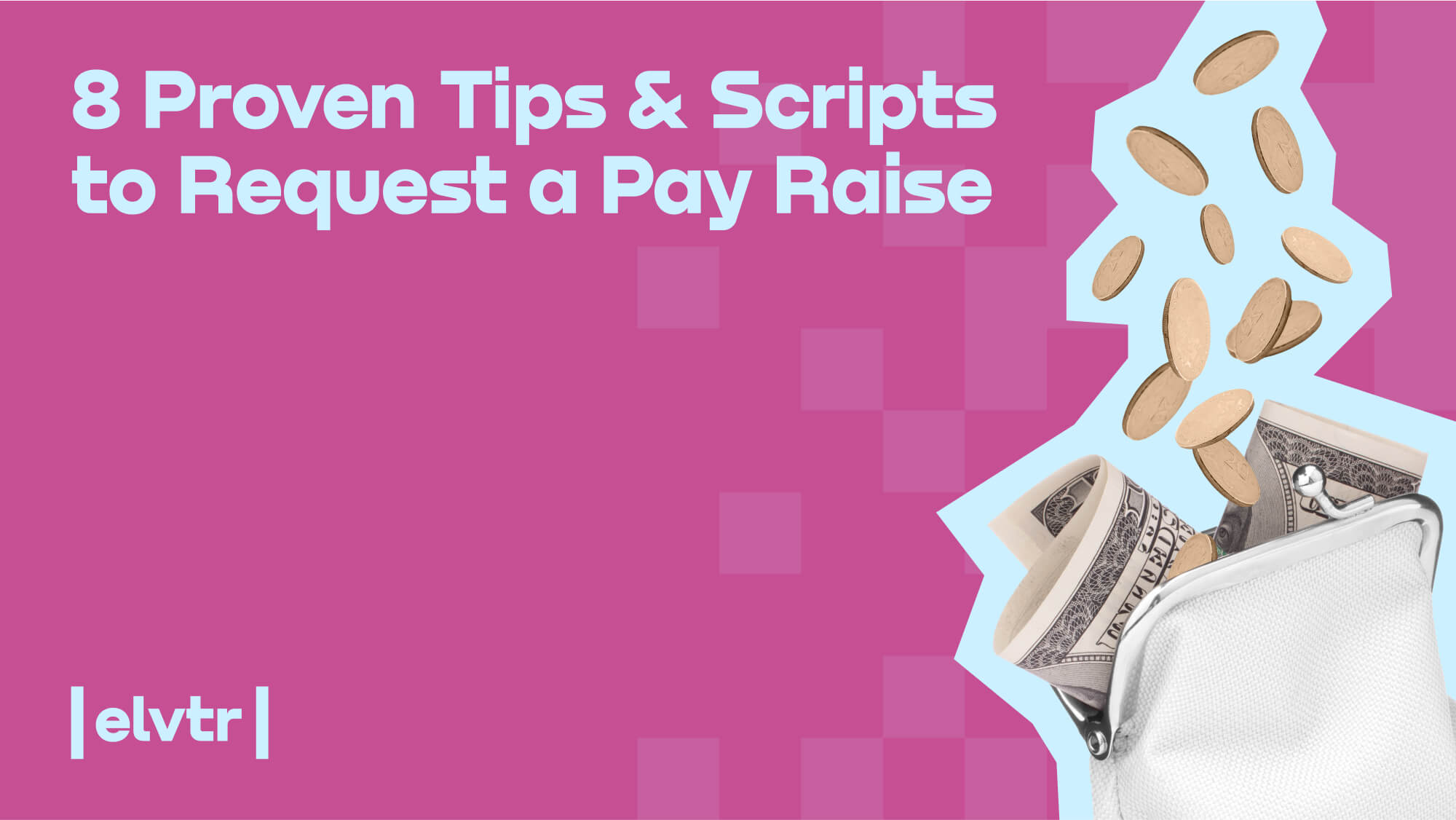- MAIN PAGE
- – elvtr magazine – 8 PROVEN TIPS & SCRIPTS TO REQUEST A PAY RAISE
8 PROVEN TIPS & SCRIPTS TO REQUEST A PAY RAISE

Discussing a salary increase can be a tricky topic for many. Culturally, we're often conditioned to see money talk as taboo. A survey by Payscale revealed that only 37% of participants had ever approached their current boss about a pay rise. Yet, merely waiting for a salary boost isn't a proactive approach to career advancement.
To secure that pay rise, it's not just about asking; you need solid reasons. Here are valuable insights, tactics, and scripts on how to ask for a pay rise, what to communicate during salary discussions, and why making threats isn't the way to go.
#1. Be Mindful of the Timing
Not every company has a standard schedule for pay reviews. Similarly, not all companies hold annual reviews discussing an employee's contentment with their role. Often, you might need to initiate these conversations yourself.
Wondering about the best way to ask for a pay rise and when? Always be conscious of your timing. Avoid discussions right after a project mishap or during the busiest times.
-
Wait 6+ months. If you feel undervalued or believe you've shown remarkable performance, consider requesting a pay boost. For newcomers, wait at least six months to establish your value to the team.
-
Think about 2–3 months before fiscal year-end. This is when many leaders are planning budgets for the next year. Timing your request right can see it considered within these plans.
-
Stick to business hours for these discussions. Always approach the topic during working hours to be taken seriously.
#2. Notify Your Manager About the Salary Discussion
Whether in person or via email, it's pivotal to give your manager a heads up about the topic.
In your email, be straightforward and professional. Clearly outline the meeting's intent and any relevant documents you'll reference. This transparency fosters a constructive negotiation environment.
#3. Research Market Salaries
Before your discussion, investigate current job offerings and their salaries. This will serve as a reference point for your negotiations.
Utilize platforms like Indeed, LinkedIn, Glassdoor, Salary, PayScale, and Totaljobs. Weigh in factors like your industry, company size, and perks.
You might also want to inquire with HR about salary brackets for your role. Convey your commitment to the company while showcasing the significant pay gap, emphasizing that a salary bump will sustain your high-quality work.
#4. Determine Your Desired Pay Boost
Experts often recommend seeking a 10–20% salary increase. However, root your request in market research, not mere sentiment.
Also, assess your skill set and accomplishments. Reflect on projects where you played a pivotal role and any unique attributes you bring.
#5. Build a Solid Case for a Salary Increase
Select 2–3 compelling reasons that your employer will find hard to refute. Here are some strong examples:
✔️ "I consistently exceed job expectations."
Be ready with specific instances where you went beyond just completing a task and truly excelled.
✔️ "I recently secured a major deal or completed a vital project."
Significant accomplishments aren't everyday events. Recognizing these achievements with a salary increase can encourage employees to keep up their excellent work.
✔️ "I frequently receive appreciation from our clients."
Retaining current clients is often more profitable than acquiring new ones. If customers are satisfied and value your contributions, the company will likely want to retain you.
✔️ "I've taken on more responsibilities."
For example, if you initially handled only Facebook and Instagram, but later added Telegram, TikTok, and Twitter, a salary adjustment is reasonable.
✔️ "I offer a unique skill set in our company."
Reflect on your distinct abilities as they can be invaluable to your employer. However, avoid using this as a blatant leverage tactic.
Points to steer clear from when requesting a pay rise:
✖️ "I've got a better offer elsewhere."
This suggests you might leave and aren't truly open to negotiation. The reaction varies based on the employee and the offer's specifics. If the new offer is double the current salary, the company might let you go. But if it's a 30% increase and you're an asset, they might consider matching it.
✖️ "I'm more effective than my colleague."
Comparing yourself to peers isn't convincing. Employers are more interested in your individual contributions than how you stack up against a teammate.
✖️ "I've been here for 6 months; I deserve a raise."
Duration alone doesn't warrant a pay increase. Yet, if you've significantly contributed over an extended period, that's a valid point.
✖️ "Give me a raise, or I'll leave."
This confrontational approach often leads to disputes, not salary hikes.
#6. Craft a Presentation to Support Your Salary Proposal
Equip yourself with evidence: highlight your achievements over the past six months, year, and overall tenure, showcasing their impact on the company. Concrete data strengthens your case when asking for a pay raise. A presentation can effectively convey this information.
Address these points in your presentation:
-
How has your contribution positively impacted the company or department?
-
Did your team help boost sales by [Y]% recently? Did you acquire [X] new clients?
-
Were you part of pivotal projects? What were your contributions, and who were the clients?
-
When did you last receive commendable feedback, and what was it about?
For instance, "Over the past year, I brought in 5,000 leads, marking an 8% growth from the previous year, which translated to $58,000 in new business." Robust evidence bolsters your argument for a well-earned raise.
*ELVTR is disrupting education by putting proven industry leaders in a virtual classroom with eager rising stars. ELVTR courses offer 100% instructor driven content designed to give you practical knowledge within a convenient time frame. Choose the right course for you!
#7. Use Feedback as Further Proof
Incorporate positive feedback from colleagues or managers to underscore your value and alignment with company goals.
#8. Be Assertive
When asking for a pay rise, avoid tentative language. This isn't the time to be modest; confidently present your case.
Responding to a "No" or "Maybe" Response:
Inquiring, "What steps can I take to earn a raise?" is a constructive approach if your request is declined. It's useful to request specific performance metrics or KPIs. For example, a commitment might be: once you boost sales by 20%, you'll earn an extra $500 monthly.
Consider the "added value" concept. Say, if a software developer's feature earns the company an added $500,000 monthly, a salary bump is a justified reward. If an employee dramatically cuts costs leading to significant savings, a proposal to increase their pay will likely gain traction.
Tip: Consider reading "Never Split the Difference: Negotiating As If Your Life Depended On It" by Chris Voss. This former FBI hostage negotiator provides invaluable insights on effective negotiation techniques.


